ONE VCU: RESPONSIBLE TOGETHER - Get info about VCU's phased approach to reopening campus at together.vcu.edu.
Ejana Bennett
Social Chair, VCU Holmes Scholars Program
Ph.D., School of Education
Program Area: Curriculum, Culture and Change
Projected Completion: May 2023
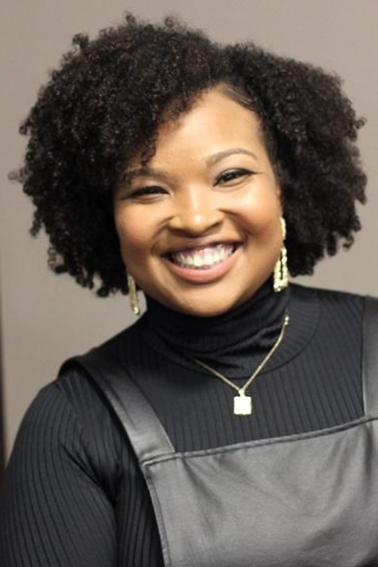 Education
Education
- Ph.D. (Education: Curriculum, Culture and Change), Expected Graduation May 2023
Virginia Commonwealth University, Richmond, Virginia - M.T. (Elementary Education, endorsement in Special Education), May 2015
University of Virginia, Charlottesville, Virginia - B.A. (Psychology), May 2015
University of Virginia, Charlottesville, Virginia
Line of Research
My research examines how teacher and student critical racial consciousness impacts racial identity development, student learning outcomes, and student belonging to positively address racialized opportunity gaps.
Research and Scholarship
- Parkhouse, H., Bennett, E., Pandey, T., Lee, K., Wilson, J. (accepted) Opposition to Culturally Relevant Education Among Practicing Educators: Is CRE a Choice or a Professional Expectation? Educational Researcher.
- Tichnor-Wagner, A., Bennett, E., Parkhouse, H., & Schcolnik, A. (accepted) Towards a Cohesive Union? Currents and Cleavages in State Civic Education Policy Discourses. American Journal of Education.
- Parkhouse, H. & Bennett, E. The Power of Action Research for Developing Culturally Responsive Teaching Practices: A Case Study of Three Secondary Social Studies Teachers.
- Bennett, E., Merritt, A., & Parkhouse, H. Towards Effective Culturally Responsive Teaching Professional Developments for Black Educators.
- Gómez, R., & Bennett, E., & Cammarota, J. The Battle for Curriculum: Reconciling Racism with Critical Race Theory and Ethnic Studies.
- Gómez, R., Apugo, D. & Bennett, E. “We Look Like the Brady Bunch”: Chicana and Black Women Faculty Critical Incidents of Microaggressive Attacks as Barriers to Decolonization Work.
- Gómez, R., & Bennett, E., & Cammarota (2022, June) The Battle for Curriculum in the Racial State: Reconciliation of Racism through Ethnic Studies and CRT. Presenation at the National Conference on Race & Ethnicity in Higher Education, Portland, Oregon.
- Gómez, R., & Bennett, E. (2022, April) Racial Identity Development Toward Transformative Pedagogy. In Nicolai, K. & Chen, K. (Chairs), Discussing Race, Ethnicity, and Culture While Teaching Educational Psychology [Symposium]. American Education Research Association, San Diego, California.
- Bennett, E. (2022, March). Turning the Mirror on Yourself: Racial Identity Development in Teacher Education. Presentation at the AACTE Holmes Preconference, New Orleans, Louisiana.
- Bennett, E., Merritt, A., & Parkhouse, H. (2021, April) Towards Effective Culturally Responsive Teaching Professional Development for Black Teachers. Presentation at the American Education Research Association, Virtual.
- Tichnor-Wagner, A., Bennett, E., Parkhouse, H., & Schcolnik, A. (2021, April) Towards a Cohesive Union? Currents and Cleavages in State Civic Education Policy Discourses. Presentation at the American Education Research Association, Virtual.
- Bennett, E. (2021, February). The Need for Professional Development on Culturally Responsive Teaching for Black Educators. Presentation at the AACTE Holmes Preconference, Virtual.
- Parkhouse, H. & Bennett, E. (2020, December). The Power of Action Research for Developing Culturally Responsive Teaching Practices: A Case Study of Three Secondary Social Studies Teachers. Presentation at the National Council for Social Studies Conference, Washington, DC.
- Bennett, E. (2020, February). The Need for Critical Racial Consciousness in a Colorblind Teaching Force. Presentation at the AACTE Holmes Preconference, Atlanta GA.
- Yingling, T., Lyn, R., Bennett, E., Lambert, A., Hanley, E., Nicolai, K., Venning, C., Rawls, M. (2020, October). Anti-Racist Transdisciplinary Coalition in Higher Education. Presentation at the 17th Annual Metropolitan Educational Research Consortium Conference. Richmond, VA.
- Parkhouse, H., Senechal, J., Bennett, E., Gui, J., Lyn, R., Merritt, A., Mann, M., Kenup, A., O’Neal, C., & Macaulay, S. (2019, October). Designing Effective Professional Development to Support Culturally Responsive Teaching. Presentation at the 16th Annual Metropolitan Educational Research Consortium Conference. Richmond, VA.
- Metropolitan Educational Research Consortium- Research Project: Professional Development for Success in Culturally Diverse Schools
- Professional Development Designer- Henrico Public Schools, Culturally Responsive Teaching Microcredential
- Professional Development Facilitator- VCU Summer Learning Institute- Professional Development Title: Racial identity development toward transformative pedagogy
Biography
Ejana Bennett is a third-year doctoral student in the School of Education at Virginia Commonwealth University. She is the current president of the VCU Holmes Scholars Program. She works as a graduate research assistant with the VCU Teaching and Learning department. She has practitioner experience as a former elementary school teacher in Richmond Public Schools. She also has experience teaching special education in a charter school in Brooklyn, NY. She currently examines the impact teacher racial identity development and teacher critical racial consciousness has on student outcomes such as student critical consciousness, student-teacher relationships, and student belonging. The key issues she investigates are the underdevelopment of racial identity in teachers, and how this lack of critical race consciousness among K-12 public school teachers, creates classrooms that are violent spaces for Black, Idigenous, People of color (BIPOC) students, as many teachers do not realize the ways that they uphold Whiteness and continually reproduce race in their classrooms.
What does the Holmes Scholars Program mean to you?
VCU Holmes Scholars program means being seen, heard and understood as a historically marginalized student. The VCU Holmes Scholars program fulfills my yearning to be supported and mentored without partaking in what W.E.B. DuBois calls, “double consciousness”. I am a part of a supportive network of peers and have access to unique professional experiences that will lead to my overall success in academia. I am surrounded by like-minded doctoral students and mentors who look like me and support me through my educational journey.
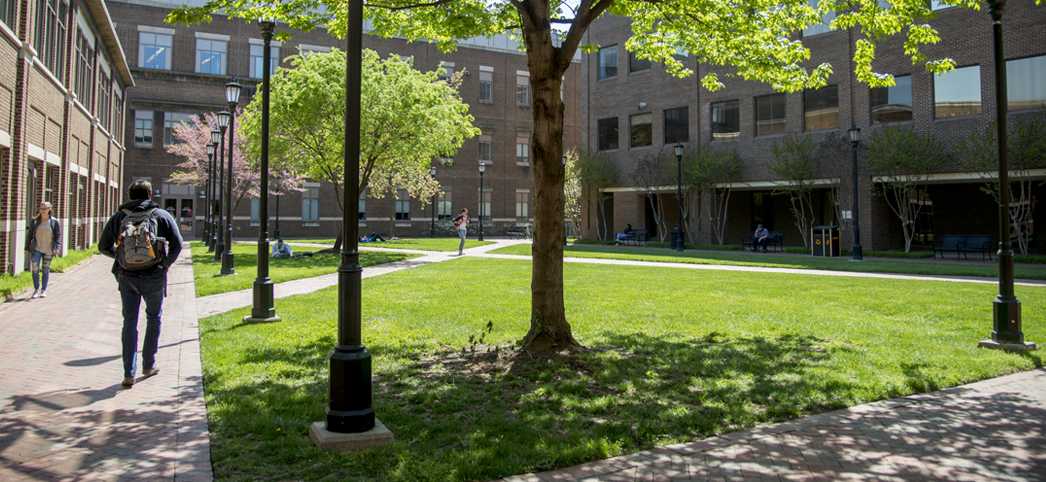
Strategic Plan Year 2 (2020-21) Summary
The Strategic Planning and Implementation Committee articulated 46 strategies aimed at scaffolding the School of Education toward meeting the Strategic Plan goals and 66 outcome measures to support transparent reporting and monitoring toward goal achievement.
Learn more about our Strategic Plan Year 2 (2020-21) Summary
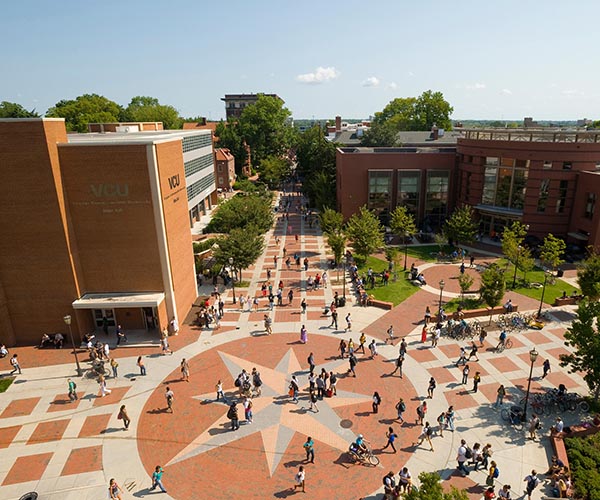

Toll-Free / 24 hours a day / 7 days a week
1-800-SUICIDE (1-800-784-2433)
1-800-273-TALK (1-800-273-8255)
Deaf Hotline 1-800-799-4TTY (4889)
1-800-799-SAFE
1-800-799-7233
1-800-787-3224
1-800-942-6908 (Spanish Speaking)
1-847-831-3438 (long distance)
1-800-252-8966
1-800-621-0379
1-800-458-5231
1-800-342-AIDS (2437)
AIDS Hotline in Spanish: 1-800-344-SIDA (7432)
AIDS Hotline for the Hearing Impaired: 1-800-243-7889
1-800-227-8922
Parent Hotline is a website dedicated to helping families who are in a crisis situation: 1-800-840-653
1-800-656-4673
Virginia Department of Aging and Rehabilitation Services (DARS): (804) 662-7331
Henrico Community Service Board: (804) 727-8484
Child Abuse and Neglect Hotline: 1-800-552-7096
Richmond VAMC Mental Health Crisis Hotline: (804) 675-5971 (8255)
Child Savers: (804) 305-2420
National Domestic Violence Hotline: 1-800-799-SAFE (7233)
AIDS Hotline: 1-800-553-4148
National Sexual Assault Hotline: 1-800-656-HOPE (4673)
National Runaway Hotline: 1-800-786-2929
National Drug and Alcohol Recovery Hotline: 1-888-319-2606
Drug and Alcohol Recovery Hotline: 1-888-298-6689
National Suicide Prevention Hotline: 1-800-273-8255
Red Cross Emergency Number: 1-800-733-2767
SEXUAL ASSAULT/DOMESTIC VIOLENCE ASSISTANCE
Greater Richmond Regional Hotline: (804) 612-6162
YWCA of Richmond: (804) 643-6761
6 N. 5th St.
Richmond, VA 23219
Hours: 8:30 a.m. - 4:30 p.m. or by appointment
The James House Intervention/Prevention Services: (804) 458-284-0229
North Sycamore Street
Petersburg, VA 23802
By appointment only
Safe HarborShelter: (804) 249-9470
http://safeharborshelter.com
CARES: (804) 861-0849
http://cares-va.org/seeking-shelter/

- Lisa Abrams, Ph.D.
- Interim Department Chair
- (804) 827-2627
- lmabrams@vcu.edu
Once a regular renewable license is obtained, individuals can add certain additional endorsements based on one of two options:
- Content Coursework (see VCU certificates or non-degree class options)
- Praxis II Testing
Learn more about adding endorsements on the Virginia Department of Education (VDOE) website.
*Note: Please reference updated requirements and regulations on the VDOE website.

- Donte Sharp, M.Ed.
- Academic Advisor
- soeadvising@vcu.edu

- Karen Meister, M.S.
- Senior Academic Advisor
- SOEadvising@vcu.edu
Moe Debbagh Greene
President, VCU Holmes Scholars Program
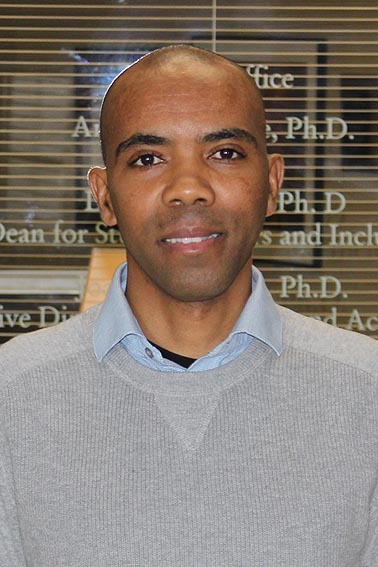
Education
- Ph.D. in Education
- Dissertation study: A Quantitative Analysis of the Relationship between Dispositions and Technological Knowledge of English Language Teachers
- Chair: Dr. Monty Jones
- Dissertation Chair: William Jones, Ph.D.
- M.Ed. in Curriculum and Instruction: Instructional Technology, Virginia Commonwealth University – Richmond, VA, May 2015.
- Ph.D. in Languages, Cultures and Communication, Mohamed I University – Oujda, Morocco, December 2014.
- M.A. (DESA) in Humanities and Area Studies: Discourse Studies (Linguists/ EFL), Mohamed I University – Oujda, Morocco, January 2007.
Line of Research
My research interest is in instructional technology. I examine how the intersection of noncognitive factors such as self-efficacy, beliefs, dispositions and race with emerging technologies impact teacher’s knowledge development and student learning outcomes, positively addressing digital and behavioral skills gaps.
Research and Scholarship
- Schad, M., Greene, M.D., & Jones, W. (in Press). A review of theory, theoretical and conceptual frameworks in educational technology. Journal of Educational Multimedia and Hypermedia (JEMH).
- Greene, M.D., & Jones, W. (2020). Analyzing contextual levels and applications of technological pedagogical content knowledge (TPACK) in English as a second language subject area: A systematic literature review. Educational Technology & Society, 23 (4), 75-88.
- Greene, M.D., & Jones, W. (2020). Towards a critical conceptual framework for technology integration in professional development for English language teachers. Journal of Educational Multimedia and Hypermedia (JEMH), 29 (2), 113-132.
- Greene, M.D., & Jones, W. (2020). Implications of technological instructional practices for English as a second language vocabulary learning. International Journal on E-Learning, 19 (3), 209-228.
- Greene, M.D., & Jones, W. (2018). Examining English language teachers’ TPACK in oral communication skills teaching. Journal of Educational Multimedia and Hypermedia (JEMH), 27 (1), 43-62.
- Greene, M.D. (2012). Discourse analysis of the representations of women in Moroccan broadcast news. The Journal of North African Studies, 17 (4), 653-670.
Biography
Moe Debbagh Greene is the Associate Director of English Language Program, Global Education Office, Virginia Commonwealth University. He is currently a doctoral student in the Curriculum, Culture and Change program at VCU. He completed his Ph.D. abroad in “Languages, Cultures and Communication,” and he earned a Master’s degree in Curriculum and Instruction: Instructional Technology from VCU. He is a Fulbright recipient who has a record of significant and productive leadership in the areas of English language program management, accreditation, assessment, curriculum, teaching and learning. He works with both faculty and students to invest in programs that maximize the educational experiences of all students. His research interests include instructional technology, teacher’s technological, pedagogical and curricular knowledge development and the impact of emerging technologies on student learning outcomes.
What does the Holmes Scholars Program mean to you?
The Holmes Scholars program has provided me with the resources and opportunities to attend conferences and develop my research ideas in a community of researchers, faculty, and students in the field of education. Networking events organized by the Holmes Scholars program facilitated my access to mentoring opportunities and participation in workshops and research initiatives. The program’s commitment to continuous improvement and on-going professional development have no doubt positioned me to make intentional decisions about my career and research path.

- Donna M. Gibson, Ph.D.
- Counseling & Special Education
- (804) 828-1332
- dgibson7@vcu.edu

- Donna M. Gibson, Ph.D.
- Department Chair
- (804) 828-1332
- dgibson7@vcu.edu
VCU School of Education May 2022 New Graduate Student Welcome Newsletter
Good afternoon new VCU School of Education graduate students,
If you are newly accepted, see past newsletters above this accordion with information on everything from funding your graduate education, how to find your advisor, to billing, installment plans (video here) and ways to make the most of your program.
Tips from our Leadership: “Engagement and building relationships are critical”
Watch this welcome video from Dr. Luciana de Oliveira, Associate Dean of Academic Affairs.
Engage with us - Events open to all
- From our VA Engage Network friends: Civic Action Conversation on Workforce Development, Wednesday, May 11 at 6:30pm. Registration here.
- Developmental Disability and Child Welfare: What Do You Need to Know? From our Partnership for People with Disabilities Center and the VaLEND program, interactive discussion and panel on Tuesday, May 24 from 12-1pm. Facebook live stream here.
Summer Start Add/Drop Deadlines
If you are starting your program this summer, please see the chart and information below from Lois Clay Vogle for important summer dates.
NEW Graduate Assistant of Assessment for Residential Life and Housing
Position Description - Link to apply
The Graduate Assistant of Assessment for Residential Life and Housing is a graduate student live-off position supervised by the Assistant Director of Residential Life and Housing for Assessment. Key contributions to the department include:
- Providing significant administrative support to the Assistant Director in the implementation of assessment culture and initiatives
- Developing surveys and rubrics using Campus Labs Baseline
- Developing protocols for interviews and focus groups with students and/or staff
- Assisting with the analysis and interpretation of qualitative and quantitative data as needed using various tools and software
- Developing data visualizations and reports appropriate for specific audiences
- Assisting with the development and implementation of assessment workshops and trainings for RLH staff
Time commitments are generally limited to office hours and administrative tasks, but could extend into occasional after-hours work such facilitating focus groups with students and supporting departmental initiatives.
Stay in the Loop
Don't forget to follow us on Facebook, Twitter, Instagram, LinkedIn and YouTube to stay up-to-date. We aim to limit how many emails we send to you, yet there are opportunities and events happening all the time that we post on our different social media channels.
Quick reminders
All official VCU information will be sent to your VCU email account (financial aid, billing, academic program information, etc). Please activate your account as soon as possible. Need help with this? See this new accepted graduate student checklist and this page about activating your VCU eID. This will get you access to your eServices account where you can see all sorts of information about your student account.
If you have not already, please send respondgrad@vcu.edu an email with your acceptance of your offer. Even if your program asks you to tell them directly, the email to respondgrad@vcu.edu is required by all incoming students and must come directly from the student to officially activate your account for enrollment.
Summer Studies 2022
- Adds and drops. Students may add or drop a class until close of business on the day after the first day of class. Students who drop a class by this date will receive a refund.
- Withdrawals. The last day to withdraw is the midpoint of the class. There are no refunds for summer withdrawals.
- Student holidays. Classes do not meet Monday, May 30; Monday, June 18; and Monday, July 4, 2022.
- Exams. Exams are given on the last scheduled day of class.
| CLASS DATES | SPECIAL DEADLINES | ||||||||||||||||||
| Number of Weeks | Classes Start | Last Day for Add/Drop | Last Day to Withdraw | Classes End/Final Exams | |||||||||||||||
| 3 | May 23 | May 24 | June 1 | June 10 | |||||||||||||||
| 5 | May 23 | May 24 | June 7 | June 23 | |||||||||||||||
| 8 | May 23 | May 24 | June 20 | July 13 | |||||||||||||||
| 8 | May 24 | May 25 | June 21 | July 14 | |||||||||||||||
| 4-5 | May 13 | June 14 | June 27 | July 13 | |||||||||||||||
| 6 | May 13 | June 14 | July 4 | July 21 | |||||||||||||||
| 8 | May 13 | June 14 | July 11 | Aug. 3 | |||||||||||||||
| 8 | May 14 | June 15 | July 12 | Aug. 4 | |||||||||||||||
| 5 | June 27 | June 28 | July 12 | July 28 | |||||||||||||||
| 4-5 | July 14 | July 15 | July 28 | Aug. 12 | |||||||||||||||
| 3 | July 25 | July 26 | Aug. 3 | Aug. 12 | |||||||||||||||
Questions? Email soeinfo@vcu.edu.

Applications, Admissions, and Yield
- SOE Admissions Program Detail {requires VPN and eID/password}
- SOE Admissions Summary {requires VPN and eID/password}
- SOE Out of State Admissions {requires VPN and eID/password}
- SOE Race and Ethnicity Equity in Admissions {requires VPN and eID/password}
- Applicant Military Affiliation
Applicant Feedback
- Incoming Undergraduate Student Survey Dashboard
- Incoming Graduate Student Survey Dashboard
- Declining Undergraduate Applicant Survey Dashboard
- Declining Graduate Applicant Survey Dashboard
Enrollment
- SOE Enrollment Program Detail {requires VPN and eID/password}
- SOE Enrollment Summary {requires VPN and eID/password}
- SOE Declared Minors
Licensure Gate Monitoring
- Initial Gate 1 Dispositions Self-Assessment at Application to Teacher Preparation Scores
- Initial Gate 4 Final Licensure Exam Audit: VDOE Biennial Report; Title II
EPP-Wide Common Outcomes, reported in aggregate
- CAEP EPP-Wide Initial Mid-Program Lesson Plan Student Learning Outcome Findings
- CAEP EPP-Wide Initial Mid-Program Dispositions Student Learning Outcome Findings
- CAEP EPP-Wide Initial Clinical Evaluation Continuum Student Learning Outcome Findings
- Initial Pre-Gate 1 Entry Testing Pass Rates and Subtest Scores
EPP-Wide Common Outcomes, reported by program
- CAEP Program Detail Initial Mid-Program Lesson Plan Student Learning Outcome Findings
- CAEP Program Detail Mid-Program Dispositions Student Learning Outcome Findings
- CAEP Program Detail Initial Clinical Evaluation Continuum Student Learning Outcome Findings
Licensure Tests
Program-Specific Outcomes
- Early Childhood Education & Teaching, BSED
- Elementary Education & Teaching, BSED
- Health & Physical Education & Teaching, BSED
- Secondary Education/Teaching Engineering, BSED
- Special Education, BSED
- Special Education – Early Childhood, BSED
- Teaching Elementary Ed, CERTGR
- Early/Elementary Education, MT
- English Education, MT
- History / Social Studies, MT
- Mathematics, MT
- Sciences, MT
- Special Education General Education, MED
- Early Childhood Special Education, MED
- Adapted, MED
Licensure Tests
Program-Specific Outcomes
Student Experience
- Student Experience Survey Dashboard
- Advising Survey Dashboard
- REAL Dashboard {Select Secure Dashboards, Select REAL Dashboard}
- DEI Course Evaluation Data by Department Report
Student Success and Completer Outcomes
- Undergraduate Retention Rates {requires VPN and eID/password}
- Undergraduate Graduation Rates {requires VPN and eID/password}
- Next Term Registration & Stop Out Monitoring Dashboard
- Time to Degree Program Detail
- VCU Time to Degree {Select Secure Dashboards, Select Department Profiles, Select Time to Degree tab at the top of the Department Profiles Dashboard} {requires VPN and eID/password}
- VCU First Destinations Survey Dashboard {Select Secure Dashboards, Select First Destinations Survey Dashboard}
- SOE First Destinations Survey Custom Item Dashboard
- VCU EPP Program Completers Employed in Virginia Public Schools
- VCU EPP Program Completers Employed in Virginia Public Schools by School Title I Status
Initial Licensure Completer Feedback
Initial Licensure Employer Feedback
Virginia Education Assessment Collaborative Resources
Initial Licensure Performance in Practice
Completer Feedback
Employer Feedback
CACREP
- Counselor Education CACREP Annual Program Assessment Report
- Counselor Education Employer Survey Report
- Counselor Education Completer Survey Report
Virginia Education Assessment Collaborative Resources
Doctoral Feedback
CAEP Accountability Measures

- Tosha Yingling
- Instructor
- (804) 828-3876
- yinglingnc@vcu.edu
In addition to the six programs listed below,
our General Education courses are open to all VCU undergraduate students.
Current and future provisional special education, general education teachers, please see the NEW Course Finder tool to plug in your VDOE requirements to identify courses at VCU School of Education that fulfill these requirements.

- W. Monty Jones, Ph.D.
- Co-President, Faculty Org
- (804) 828-1305
- joneswm2@vcu.edu

- Karen Meister, M.S.
- Senior Academic Advisor
- soeadvising@vcu.edu

- Donte Sharp, M.Ed.
- Academic Advisor
- soeadvising@vcu.edu

- Laura S. Domalik, M.Ed.
- Coordinator
- (804) 828-1305
- lsdomalik@vcu.edu

- Lisa Cipolletti, M.Ed.
- Coordinator
- (804) 828-1305
- cipollettilb@vcu.edu

- Donte Sharp, M.Ed.
- Academic Advisor
- SOEadvising@vcu.edu

- Caimdyn C. Stewart, M.Ed.
- Senior Academic Advisor
- (804) 482-0874
- SOEadvising@vcu.edu
Contact Caimdyn for undergraduate level teacher preparation questions.
Prerequisite or summer before entering
- STAT 508 — (Introduction to Social Statistics) or equivalent
Fall (first year)
- CLED 720 — Doctoral Seminar I (three hours)
- CLED 730 — Advanced Theories and Practicum (three hours)
Spring (first year)
- CLED 721 — Doctoral Seminar II (three hours)
- CLED 740 — Counseling Supervision (three hours)
- CLED 810 — Doctoral Internship-Research (one hour)
Fall (second year)
- EDUS 810 — Doctoral Internship-Teaching (three hours)
- EDUS 700 — Externship-Supervision of Practicum (three hours)
Spring (second year)
- CLED 750 — Advanced Group Counseling (three hours)
- CLED 770 — Advanced Leadership in Social Justice and Advocacy for Counselor Educators (three hours)
- EDUS 702 — Foundations of Educational Research I (three hours)
Summer (second year)
- EDUS 703 — Foundations of Educational Research II (three hours)
Fall (third year)
- EDUS 608 — Statistics for Social Research (three hours)
- EDUS 711 — Qualitative Methods and Analysis (three hours)
Spring (third year)
- EDUS 710 — Educational Research Design (three hours)
- Research elective (three hours)
- School of Education Qualifying Assessment
Summer (third year)
- Counselor Education and Supervision Comprehensive Exam
Fourth year
- EDUS 890 — Dissertation Seminar (three hours)
- EDUS 899 — Dissertation (six hours)
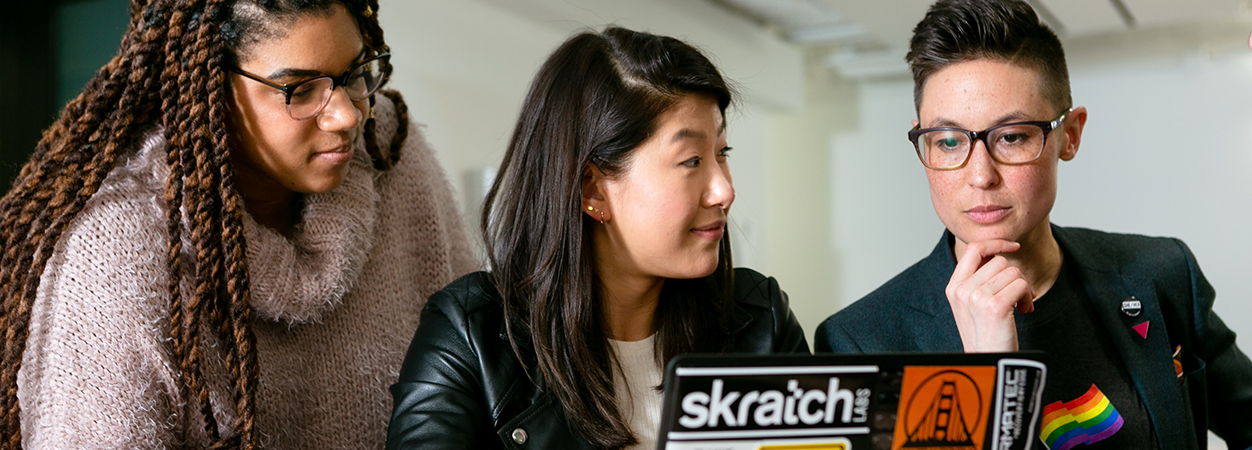
Vision
To be a leader in responsive, needs-driven and research-based educational practices that transform the lives of those we serve in our communities, especially those who have been historically marginalized.
Mission
We advance learning and knowledge through impactful research, teaching and engagement to provide our students, professionals and communities with the tools to create progressive change. We prepare and support professionals to lead change and inform social, economic, health and educational policy and practice.
Values
Innovative – Cultivate discovery, creativity, originality, inventiveness and talent.
Inclusive – Ensure a climate of mutual trust and respect where individuals of differing cultural backgrounds, identities, abilities and life experiences are embraced, engaged and empowered to drive excellence and success.
Community-focused – Build deliberate/intentional relationships with the surrounding community and engage in actions that focus on the needs of its people.
Collaborative – Foster collegiality and cooperation with internal and external partners to advance learning, research and service.
Theme 1: Student Success
Goals and Strategies
SS1: The VCU SOE will provide comprehensive resources to support students as adult learners and foster a climate of holistic student success. (Tomika; subleads-Krystal, Chairs)
- Monitor student success metrics to inform and develop appropriate policies and practices and resources to ensure that areas of improvement identified through the dashboard and matrix are prioritized and supported through sustainable action.
- Create, implement, and evaluate initiatives that improve student mental health, belonging, academic advising, support services, and career preparation to enhance student success.
- Increase the proportion of full-time faculty providing instruction in the School of Education.
SS2: The VCU SOE will encourage learning excellence through exceptional multi-modal and interdisciplinary learning experiences for all students. (Lu; subleads-Chairs, Pam)
- Enhance on- and off-campus partnerships to integrate academic success skills, strategies, and collaborative learning opportunities.
- Improve existing learning environments with enhanced technology to align with and enhance 21st Century teaching practices for in-person and virtual learning.
- Enhance technology training and immersion into coursework for all programs to prepare graduates equipped to teach and lead in online and face-to-face environments using 21st Century technology best practices.
- Establish a faculty and staff development plan utilizing internal and external resources that facilitates innovation in learning and strengthens pathways for faculty, staff, and students to demonstrate best educator practices.
SS3: The VCU SOE will engage in collaborative partnerships that prepare educators to meet the needs of various learners while cultivating/advancing community growth. (Lu; subleads-Lora, Chairs)
- Collaboration between academic departments, administrative units, state and national policy makers and community partners to identify shared resources and funding opportunities.
- Strengthen clinical partnerships and practice through:
- community stakeholder co-construction, design, and evaluation of multiple clinical opportunities to ensure candidate preparation through experiences in diverse settings where P-12 students with differing needs are enrolled;
- opportunities for partners to co-select, prepare, evaluate and support high-quality clinical educators, both provider- and school-based, who demonstrate a positive impact on candidates’ development and P-12 student learning and development;
- co-design and implementation of clinical practices, utilizing various modalities that are of sufficient depth, breadth, diversity, coherence and duration to ensure candidates develop the ability to impact diverse P-12 student learning and development.
- Provide comprehensive resources to implement and evaluate school level coordination of all clinical experiences (advanced and initial programs) to ensure high quality experiences through consistency in 1) administration and data collection of student and placement metrics and 2) quality control and data use for continuous improvement.
Theme 2: Research and Innovation to Address Societal Challenges
Goals and Strategies
RIASC1: Pursue national prominence and differentiate from other strategic planning efforts, recognizing that national prominence is determined by external evaluations of SOE (ex. Carnegie Classification of Institutions of Higher Education, US News and World Report, and The Center for Measuring University Performance). (Kathy; subleads-Chairs, Jose)
- Specific action to increase SOE’s prominence on the national stage by:
- increasing the submission of nominations for national awards of recognition.
- encouraging staff and faculty to pursue leadership roles in national organizations.
- encouraging staff and faculty to pursue leadership through journal editorships.
- Gain external recognition for innovation in public scholarship.
- Provide professional development and leadership advancement opportunities and support for career progression for faculty and staff from all groups, ensuring access to members and populations historically marginalized* in their fields, in the continued development of scholarship, research, creative expression and service that expand an inclusive knowledge base.
RIASC2: Increase federal and foundation research grants awarded to VCU SOE. (Kathy; subleads-Chairs, Jose)
- Submit high quality, competitive applications for external research funding.
- Align evaluation expectations of SOE tenure-track faculty (pre-tenured and tenured) to be commensurate with the research expectations of an R1 university.
RIASC3: Elevate the status of SOE within the VCU, local and national / international research community. (Kathy; subleads-Chairs, Jose, Communications)
- Seek out and pursue strategic collaborations and opportunities with initiatives that focus on elevating interdisciplinary, transformative research in schools and communities, especially those serving individuals who are historically marginalized.
- Promote successes of SOE via both university-wide and external (local and national) outlets using communication modes and strategies that increase engagement.
- Professional development for faculty on expanding knowledge of and opportunities for seeking funding from multiple sources.
RAISC4: Achieve and maintain national accreditation (e.g., CAEP, CACREP) for all licensure programs. (Lora; subleads-Chairs)
- Identify and implement an infrastructure to engage EPP stakeholders to:
- facilitate, support and monitor the transition within the School of Education from a culture of compliance to a culture of evidence to ensure ongoing alignment, integrations of accreditation regulations (e.g., CAEP, CACREP, VDOE) goals/strategies with SOE mission/vision/strategic plan; and
- improve P-12 school and EPP student, candidate and completer performance.
- Ensure VDOE program approval and updates to align with existing and new regulations and policies.
- Ensure that unit-wide assessment data collection processes are in place for undergraduate programs to ensure candidate, program and completer quality;
- Ensure that unit-wide assessments processes are in place to support Counselor Education’s aim to meet all CACREP standards and pass its accreditation review
- Incorporate goals and processes into CITF that address CACREP accreditation needs.
Theme 3: Thriving Communities
Goals and Strategies
TC1: Advance innovations for high quality education and workforce development to meet the challenges of schools and communities, particularly those that serve historically marginalized individuals and communities and multilingual learners. (Kim, lead; Parthy, Cassandra, Al, co-leads)
- Determine sustainability options for the RTR Teacher Residency Program
- Develop and sustain workforce development programs including SOE Center initiatives (e.g., Partnership for People with Disabilities (PPD); Research and Rehabilitation Training Center (RRTC); Center for Innovation in STEM Education; Office of Strategic Engagement).
TC2: Produce new, highly-trained and high-quality teachers, counselors, school administrators and other professionals prepared to work with diverse student populations and more representative of the racial and ethnic diversity of their communities. (Cassandra and Lora, lead; Faith, co-lead)
- Provide internal professional development for faculty/staff to expand knowledge (e.g., grant writing; national policy; working with school boards), in the area of equity to include participation in SOE and OSE professional opportunities.
- Provide support for provisionally licensed, non-traditional candidates who enroll in teacher/preparation programs to graduate and/or obtain full licensure.
- Provide support to diverse school divisions to expand partnerships that lead to newly co-constructed non-traditional, grow-your-own licensure routes.
- Provide support for diverse candidates through MERREC’s emergency funds and programming (MERREC will be part of the Center for Teacher Leadership starting in January 2023)
- Collaborate with policy makers in state or national level policy development organizations/opportunities.
Theme 4: Diversity Driving Excellence
Goals and Strategies
DDE1: Enhance the culture and cultivate belonging within the School of Education to build a diverse and inclusive community among faculty, staff, students, and community partners. (Tomika; subleads-Chairs)
- Provide high quality learning opportunities for SOE faculty, staff, students, and community partners to create actionable change in climate, diversity, equity, and inclusion, and belonging.
- Create opportunities for community building among faculty, staff, and students to cultivate a culture of belonging.
- Cultivate an inclusive and equitable learning environment for all students through classroom interactions, advising, and curriculum.
DDE2: Increase and retain the number of historically marginalized faculty and staff in the School of Education. (Andrew; subleads-HR)
- Systematically implement hiring practices that center inclusion and equity (i.e., charge, position description) across all searches in Oliver Hall and Centers.
- Analyze and share faculty demographic hiring and retention data and Culture and Climate Survey results with Center and Oliver leadership and build into chair goals.
- Develop and implement initiatives targeted to support retention of HM faculty and staff.
- In partnership with the Office of Research and Faculty Development, establish formal mechanisms for supporting historically marginalized faculty (graduate assistants with like research interests, formal pathways for promoting scholarship and teaching success of faculty).
DDE3: Increase and retain the number of historically marginalized and international students (HMS) in the School of Education. (Tomika; subleads-Recruitment team, MERREC, Lora, Yaoying, Lu)
- Implement the multi-year longitudinal, data driven strategic plan to recruit historically marginalized and international students (graduate/undergraduate).
- Create mentoring, advising, research, and faculty engagement opportunities for historically marginalized students to support retention.
- Engage in high quality learning experiences that offer historically marginalized students in all programs experiences in different settings and modalities.
- Partners engage in shared responsibility of identifying and addressing real problems of practice historically marginalized students experience in their engagement with P-12 students.
DDE4: Produce graduates who are prepared for success and impact in schools and communities serving historically marginalized individuals. (Lu; subleads-Lora, Chairs, Graduate Studies, Student Affairs)
- Understand the interests, perspectives, and needs of all SOE students for teaching and working in schools and communities serving historically marginalized individuals.
- Establish infrastructure to record and monitor graduate contact information to support understanding of all SOE program completer outcomes in schools and communities.
- Through strengthened clinical partnerships and other student experiences articulated in Theme Student Success, Goal 3, ensure HM students have equitable access to well planned, purposeful, and sequential experiences in programs and demonstrate their developing effectiveness and positive impact on diverse P-12 and adult students’ learning and development, specifically by:
- collaborating with partners to design and implement experiences, utilizing various modalities, of sufficient depth, breadth, diversity, coherence, and duration
- including campus-based and field-based activities that involve practical applications of knowledge and skills appropriate to prepare historically marginalized completers to effectively contribute to student-learning growth and apply the professional knowledge, skills, and dispositions the experiences were designed to achieve
- assessing experiences using performance based protocols throughout the program, and evaluating completer performance using valid and reliable completer and employer surveys.
- Engage Holmes Scholars and other historically marginalized doctoral mentees as mentors to historically marginalized candidates.
- Establish Holmes Scholar institutionalized funding to supply tuition waivers that will facilitate full-time enrollment, and increase academic support to undergraduate historically marginalized candidates).
- Systematically study the effectiveness of completers in schools and communities serving historically marginalized student populations, through case study design to understand opportunities to enhance preparation for those settings.
*Historically marginalized: Individuals from historically marginalized communities have an identity that has been historically excluded or underrepresented within higher education, including by race/ethnicity (African American/Black, Hispanic/Latinx, Native Hawaiian, Pacific Islander, and two or more races, when one race is from a preceding group), disability status, first-generation college status, or socioeconomic status. We refer to those historically marginalized by racial and ethnic backgrounds in this strategic plan.
Strategic Plan Update and Next Steps for 2022-24
In this video, Angela P. Wetzel, Ph.D., director of the Office of Data Analytics, provides an update to the School of Education Leadership Council on June 30, 2022 on the Strategic Plan and next steps for 2022-24.
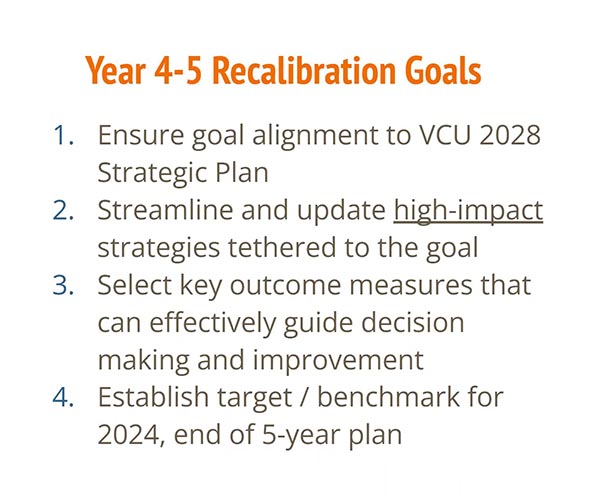

Phi Kappa Phi Graduate Scholarships
For this universitywide scholarship, applicants must have a cumulative grade point average of 3.8 and expect to be enrolled full-time for both semesters of the award year.
Candidates for the master's level scholarship should have completed the equivalent of at least one full-time semester. Candidates for the doctoral level scholarship should have completed the equivalent of one year of full-time study.
Available for:
Graduate students
Criteria
- Minimum GPA of 3.8
- Plan to be enrolled full-time for both semesters of the award year
NEW! Course Finder Tool
Current and future provisional special education, general education teachers, please see the NEW Course Finder tool to plug in your VDOE requirements to identify courses at VCU School of Education that fulfill these requirements.
Future Teacher Program Map Resources
Depending on the level and subject you want to teach, there are a number of different programs that may fit your unique needs and next steps. Please use the following flow charts to identify program options and next steps on your road to teaching.
New Fall 2022 Scholarship for Reading Specialists - See here for more info!
Two Degrees = Endless Opportunities
B.S.Ed. (early childhood, elementary education, and health and PE) + M.Ed. in special education, general education concentration
For students who are passionate about teaching and want to maximize their career opportunities within their specific discipline as well as special education. After completing your undergraduate School of Education licensure program, students can apply for our M.Ed. in Special Education, general education to complete an undergraduate and graduate program and two licensure areas in as few as five years*. The online MEd in Special Education, general education concentration is also available in our RTR Teacher residency program.
NOTE: This option is not eligible for B.S.Ed. students in our special education program as these licenses would be the same.
*Please note this is an estimated timeline for full-time students.
-1504x376.png)
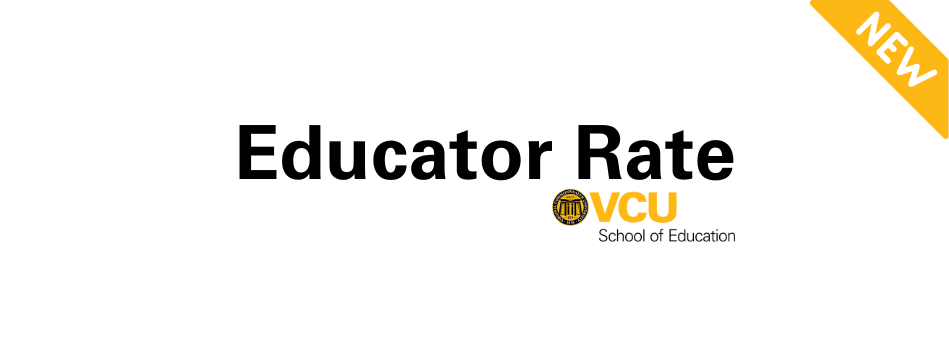
VCU School of Education Educator Rate

intro
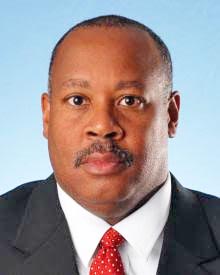 “From the first class, I realized that this program would work for people of any career. Professionally, that lesson not only has given me confidence to approach my superiors and confidently challenge policy, but also has created opportunities for me in my workplace.” - James Perkins, Ed.D. ‘20
“From the first class, I realized that this program would work for people of any career. Professionally, that lesson not only has given me confidence to approach my superiors and confidently challenge policy, but also has created opportunities for me in my workplace.” - James Perkins, Ed.D. ‘20

- Lacey E. Seaton, Ed.D.
- Coordinator
- (804) 828-1940
- seatonle@vcu.edu

Ready To Get Started?
Privacy Policy / © 2022 Virginia Commonwealth University. All rights reserved / Updated: 10/03/2024
